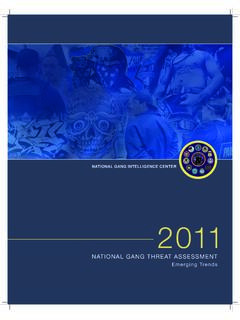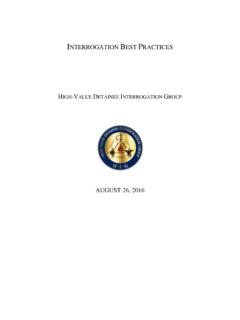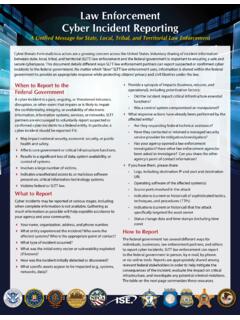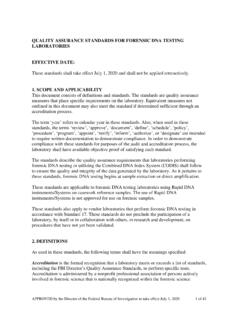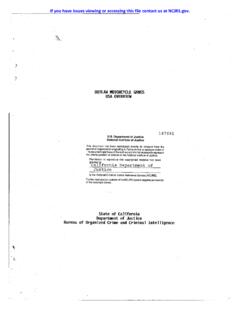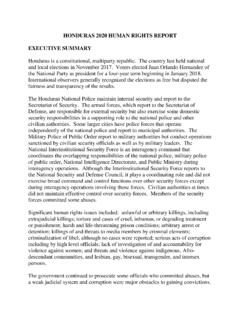Transcription of Federal Bureau of Investigation
1 Federal Bureau of Investigation Privacy Impact Assessment for the national Crime Information center (NCIC) Issued by: Erin M. Prest, Privacy and Civil Liberties Officer Approved by: Peter A. Winn, Acting Chief Privacy and Civil Liberties Officer, Department of Justice Date approved: [March 12, 2019] (May 2015 DOJ PIA Form/FBI revision August 1, 2017) Department of Justice Privacy Impact Assessment FBI/NCIC Page 2 EXECUTIVE SUMMARY The national Crime Information center (NCIC) is a national criminal justice information system linking criminal (and authorized noncriminal)
2 Justice agencies located in the 50 states, the District of Columbia, territories and possessions, and selected foreign countries to facilitate the cooperative sharing of criminal justice information. The Federal Bureau of Investigation s (FBI) Criminal Justice Information Services (CJIS) Division operates the NCIC. The NCIC s mission is to provide a timely and accurate database of current criminal justice information available to authorized criminal justice personnel 24 hours a day, 365 days a year. More information about the NCIC is available online at < > This Privacy Impact Assessment is being completed to provide an overview of the types of personally identifiable information contained in the NCIC and the use of the information to further criminal justice objectives.
3 Section 1: Description of the Information System (a) The Purpose of the NCIC The NCIC is a computerized information system containing documented criminal justice information that is searched by name and other descriptive data. The FBI established the NCIC system in 1967 as a service to facilitate the sharing of law enforcement information, and participation now encompasses criminal and authorized noncriminal justice agencies located in the 50 states, the District of Columbia, territories and possessions, and select foreign countries. The NCIC provides a system to receive and maintain information contributed by participating agencies relating to criminal justice and national security missions.
4 The NCIC now includes an extensive collection of criminal justice information that can be accessed electronically by, and furnished to, any authorized user terminal without the need for manual processing by the FBI. The NCIC contains a variety of files consisting of records contributed by participating criminal justice and authorized noncriminal justice agencies. (b) How the NCIC Achieves its Purpose Information maintained in the NCIC is readily accessible for authorized purposes by authorized users via text-based queries ( , using names and other descriptive data).
5 Authorized purposes include apprehending fugitives; solving crimes; combating acts of terrorism; locating missing persons; locating and returning stolen property; protecting individuals during declared emergency situations; protecting victims of domestic violence; monitoring registered sex offenders; conducting firearm, explosive, and weapons related permit background checks; and enhancing the safety of law enforcement officers. NCIC authorized users enter records into the NCIC, which, in turn, are accessible to authorized agencies nationwide and selected foreign agencies.
6 The NCIC queries allow authorized agencies to quickly and efficiently receive criminal justice information on individuals they encounter while performing their criminal justice and national security missions. Department of Justice Privacy Impact Assessment FBI/NCIC Page 3 (c) Information in the NCIC The NCIC contains a variety of law enforcement sensitive files and information. The NCIC has specific requirements for which agencies may enter records into a file, the necessary data elements for each record, and which agencies may access the file.
7 These requirements vary based on the data content of each NCIC file. Criminal justice and authorized noncriminal justice agencies utilize information contained in these files to meet their needs. Agencies that enter records remain responsible for the accuracy, timeliness, and completeness of those records. Requirements concerning which agencies can make entries and what data elements are required for specific entries vary according to the nature of the file. This information is further explained below in subparagraph d, Access to the NCIC. NCIC files are divided into two categories, Persons Files and Property Files, and contain the following information: 1.
8 NCIC Persons Files The following files maintained in the NCIC may contain some or all of the following descriptors and biographical information regarding individuals in the records: name; gender; race; place of birth; date of birth; height; weight; eye color; hair color; FBI number or universal control number (UCN);1 skin tone; scars, marks, and tattoos; miscellaneous numbers (MNU);2 Social Security number; driver s license number and issuing state; license plate number and issuing state; passport information; deoxyribonucleic acid (DNA) profile indicators signifying whether a criminal justice agency has an individual s DNA; addresses; country of citizenship; ethnicity; aliases; e-mail addresses and other internet identifiers; employer name; fingerprint classification information; state identification number; telephone numbers; photographs; and physical and medical characteristics or other personal information necessary to identify an individual, protect law enforcement officers, and protect law enforcement subjects.
9 Generally, all criminal justice agencies can enter records into and retrieve records from the NCIC person files. Wanted Person File The Wanted Person File contains records of individuals who have outstanding arrest warrants. This File also contains records of juveniles who have been adjudicated delinquent and who have escaped from custody or supervision or who have absconded while on probation or parole. The File also contains records of juveniles who were charged with committing an act of delinquency that would be a crime if committed by an adult and who have fled from the state in which the act was committed.
10 Agencies may also enter temporary felony want records into this File. Temporary felony want records allow a law enforcement agency to take prompt action to 1 The FBI Number/UCN is a unique identification number assigned to each fingerprint submission to the Next Generation Identification (NGI) system. 2 An MNU is any unique identifying number assigned to the subject of an NCIC record by a contributing agency such as a military number or a state identification number. Department of Justice Privacy Impact Assessment FBI/NCIC Page 4 apprehend a person suspected of committing a felony when circumstances prevent the agency from immediately obtaining a warrant.
